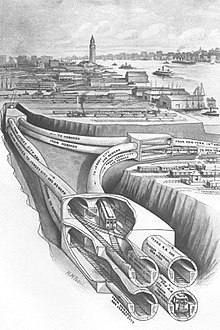Uptown Hudson Tubes

Junction in Jersey City at tubes' west end from a 1909 illustration
|
|
| Overview | |
|---|---|
| Location | Hudson River |
| Coordinates | 40°43′48″N 74°01′14″W / 40.7301°N 74.0205°W |
| System | PATH |
| Start | Christopher Street |
| End |
Hoboken Terminal Newport |
| Operation | |
| Constructed | 1874-1906 |
| Opened | February 26, 1908 |
| Traffic | Railroad |
| Character | Rapid transit |
| Technical | |
| Design engineer | Charles M. Jacobs |
| Length | 5,500 ft (1,676 m) |
| Track gauge | 4 ft 8 1⁄2 in (1,435 mm) standard gauge |
| Electrified | 600 V DC Third rail |
| Tunnel clearance | (?) diameter |
| Depth of tunnel below water level | 101 ft (30.78 m) below river level |
| Depth of shipping channel above | (?) |
The Uptown Hudson Tubes are a pair of tunnels that carry PATH trains under the Hudson River between Greenwich Village in New York City, New York and Jersey City, New Jersey. The tubes do not actually enter Uptown Manhattan.
On the Manhattan side, the tunnels follow Morton Street and Christopher Street, and the first PATH stop in New York is Christopher Street. The service in New York continues uptown to the 33rd Street terminal. On the Jersey City side, the tunnels leave the riverbank approximately parallel to 15th Street and enter a flying junction where trains can proceed to either Hoboken or Newport.
In 1873 a wealthy Californian Dewitt Clinton Haskin formed the Hudson Tunnel Company to construct a tunnel under the Hudson River from Jersey City to Manhattan. At the time constructing a tunnel under the mile-wide river was considered less expensive than trying to build a bridge over it. An initial attempt to construct the tunnels began in November 1874 from the Jersey City side. Work continued only until December 15, 1874, when progress was stopped by a court injunction brought about by the Delaware, Lackawanna and Western Railroad. Due to the lawsuit work on the tunnels was not resumed until September 1879.
...
Wikipedia

